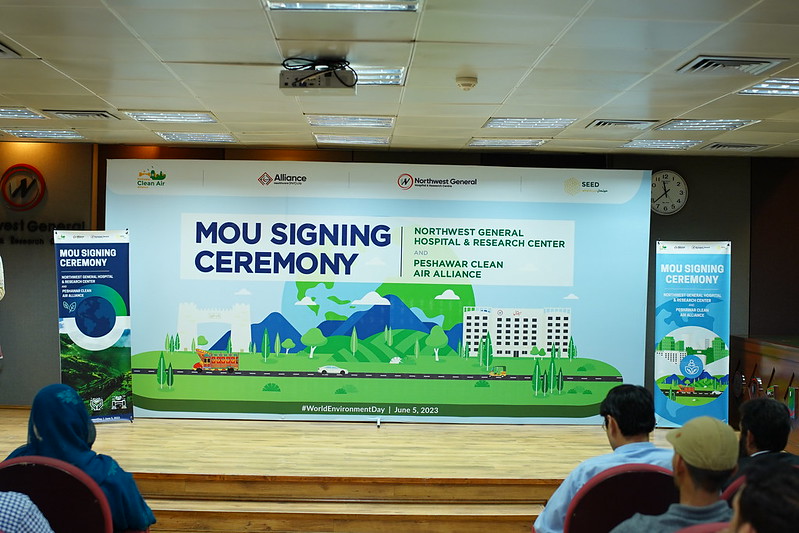Northwest General Hospital and Research Centre (NWGH) and the Peshawar Clean Air Alliance (PCAA) signed a Memorandum of Understanding (MoU) to jointly address air pollution in Peshawar on 5th June, 2023 on the occasion of World Environment Day. The collaboration aims to promote clean air and improve public health. The PCAA, formed in 2020, has been leading efforts to combat air pollution in Peshawar, which is ranked as one of the most polluted cities in Pakistan and the world.
Dr. Nowsher Yousaf, Senior Manager Occupational Health Safety & Environment formally welcomed all the distinguished guests, speakers, faculty members and students of the ceremony. He expressed his view on the theme of World Environment Day, 2023 i.e., Beat Plastic Pollution. He further elaborated the role of Northwest General Hospital & RC and Department of Occupational Health Safety & Environment in environment protection by highlighting the achievements of the team in securing various national and international certifications in the field of Environment Management. He concluded his talk by raising awareness regarding environmental protection by offering summer internships to students of various schools who attended the ceremony.
Mr. Taimur Khan, Advisor of the SEED Programme, present at the event expressed the importance of the partnership between the Peshawar Clean Air Alliance and NWGH. He highlighted SEED’s support in combating air pollution and the partnership’s role in conducting vital research and collecting data on the health effects of air pollution. This collaboration aims to enhance understanding and enable informed decision-making regarding air pollution.
Fatima Faraz Hoti, a member of PCAA and a climate change activist, highlighted the urgent need to address climate change’s impact on Pakistani youth. She emphasised that the use of fossil fuels and unsustainable agriculture contribute to climate change, resulting in limited access to nutritious food and clean water, which particularly affects young people. By engaging the youth, we can foster strong social and environmental awareness, leading to a low-carbon and climate-resilient future.
Dr. Adil Zareef, Convener of the Peshawar Clean Air Alliance, took to the stage and expressed his views about the partnership with NWGH. He shared that it is a significant step towards achieving clean air in Peshawar.
Dr. Habib Jan, Deputy Director of EPI, stated that a country’s long-term development depends on the quality of its environment. To enhance the quality of life in Pakistan, policies and activities must prioritise the preservation of resources and the environment, ensuring sustainable development.
Prof. Dr. Bushra Khan shared her contribution in the field and that she was actively engaged in surface water research for numerous years, revealing that the state of water wasn’t satisfactory. She further added that certain emerging chemicals of concern are present in industrial waste, which is discharged into waterways, ultimately causing detrimental effects on both humans and animals, leading to major health and environmental impacts. She also elucidated that the research was prompted by local complaints regarding reduced water quantity, declining water quality, and unexplained fish deaths in River Kabul and Swat. Leading a team of US scientists, she conducted the first water assessment for industrial discharge chemicals in rural Pakistan. She concluded by emphasising the importance of effective coordination in academia research for making well-informed decisions.
Dr. Zia Ur Rehman, CEO of NWGH, stressed on the importance of government institutions tackling environmental health issues and implementing policies to protect public health. He added that while private institutions can contribute, it is crucial for the government to lead in promoting sound policies. He said that sustainable programmes must be developed, focusing on the connection between healthy communities and individual well-being.
The alliance recently released a diagnostic report on air quality, highlighting the transport sector as the biggest emitter. The recommendations from the report were approved by the Chief Secretary and Cabinet, and funds were allocated for air quality monitoring. PCAA has established an air monitoring network, and data from existing monitors is publicly accessible. In support of data-driven solutions, PCAA has donated an outdoor air quality monitor to NWGH, which will collect data for research on the health impacts of air pollution. NWGH has committed to sharing the collected data with other researchers. The collaboration between PCAA and NWGH aims to develop effective strategies to combat air pollution and its adverse health effects, benefiting the citizens of Peshawar.

